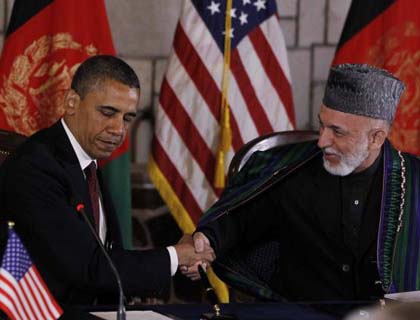After the progressive assertion of Washington officials on signing the Bilateral Security Agreement (BSA), the negotiation has entered into a new phase. In a promising turn, President Karzai authorized Dr. Spanta, the National Security Advisor, Zalmai Rasoul, Foreign Minister, and Ashraff Ghani Ahmadzai, an academician and a well-known Afghan diplomat, to advance the BSA negotiation process with James B. Cunningham, Mr. General Joseph Dunford, the US ambassador and the top general respectively in the country.
Previously, the Afghan ambassador in the US, Aklil Hakimi was representing the country on the issue. He is a young diplomat and does not have due experience to push such strategically important mission. The situation further worsened over the inauguration of political office for Taliban militants by the name and flag of the Emarat-e-Islami. Afghan officials felt neglected and blamed the US of going against what initially its earlier promises. Thus, President Karzai suspended the negotiation indefinitely which tensed the bilateral relation to a level that some US officials put ahead the zero military option after 2014 as it decided in Iraq.
Seemingly, the backdoor discussions yielded and both countries are moving closer to the bilateral agreement. However, it seems that both sides have agreed on the broader framework but details such as the number of American forces and their bases after 2014 have remained unclear. More importantly, it is not clear whether Mr. President has dropped his earlier saying that the agreement will be approved by Loya Jirga (the Grand Traditional Assembly) or not? Because right after the signature of Strategic Partnership Agreement last year, the issue of BSA has remained vague and President Karzai constantly puts his finger on foreign military presence and raises questions about their permanent bases.
Without going into the issue whether such assemblies are backed by constitution or have any legal values, it is highly important to spell out that why we need to strike the deal. Perhaps, it is believed that Afghanistan has far larger to lose in comparison to US if the agreement is not signed. The possibility of collapse of government and resurgence of insurgents appears strong in lack of foreign military presence beyond 2014. Therefore, on the basis of below reasons, we can argue that it is of high importance.
First of all, we have two political flash floods ahead: the foreign military withdrawal and presidential election both have the potentials to fuel new round of uncertainty and instability. In the first place, some influential tribal leaders do not care much about peaceful transition. During past decades they have clearly displayed that they will always be ready to tear the country into pieces if their demands are not made. Perhaps, the only thing that keep them committed to democratic values is their interests. They will switch the side if reach to a conclusion that opposite is true. Similarly, foreign military withdrawal has fuelled concerns in the country. Just looking to amount of cash pulled out and unwillingness of investors to invest as well as number of people, who have the chance, trying to seek asylum in the rest of countries are linked to deep down worry about deterioration of security situation.
Secondly, after fixation of the schedule for withdrawal, insurgents started grinning in hope that the government will be left alone that increases their chances to overrule it. Taliban leaders frequently exploited the withdrawal to encourage their battalions, showing a glimpse of light at the end of the tunnel, and vice versa warned those who support the government. The latest of such propaganda rampage was made by Hikmatiyar, the leader of Hezb-e-Islami (Islamic Party) in his Eid festival message, saying that foreign countries were exhausted of war in Afghanistan. His message addressed all those who support the government and foreign countries to get ready for paying the price.
Thirdly, complete withdrawal will pave the way for resumption of civil war. The sectarian violence in Iraq can be a very instructive lesson. Despite such huge wealth extracted from oil economy and rapid development of political parties some of which are cross cultural and sectarian, presently, the country is burning in flames of sectarian violence. The number of civilians killed in sectarian violence are far more than civilians’ casualties here. Since the start of year up to early August, more than four thousand are killed. Far deadlier scenario is foreseeable in the country in lack of foreign military presence. Iraqi security forces have acted as national force and never took side but the Afghan ones may not act similarly. The communal affiliation has remained strong and may rapidly turn problematic if the pillars of system starts shaking.
Fourthly, our neighbors have never given up interfering. They seek their interest in destabilization of the country because of their antagonism with Western countries or bringing a proxy government as they did in the past. They covertly and overtly opposed the foreign military presence rather suggesting alternatives such as their deeper involvement. Thus, the withdrawal will certainly give them another opportunity to change the country once again into the battlefield of their antagonistic interest.
Thus, all the above dangers suggest that we should strike a deal for keeping the country on the track. The continuance of foreign security forces can circumcise the above dangers. Their mere presence sends a strong message to neighboring countries that they should forget all about the past when they were developing on our labor and raw materials. Disruptive forces will not get the chance to destabilize the country for their own personal interests. Taliban and other like-minded groups will notice that overruling the government will remain as far-fetched so it is better to join the new process and follow their goals through medium. ANSF will further develop as national by the course of time as they will get the chance to evade the influence of tribal leaders or influential figures. They will receive the due training and support to fight insurgency and protect Afghan people.

